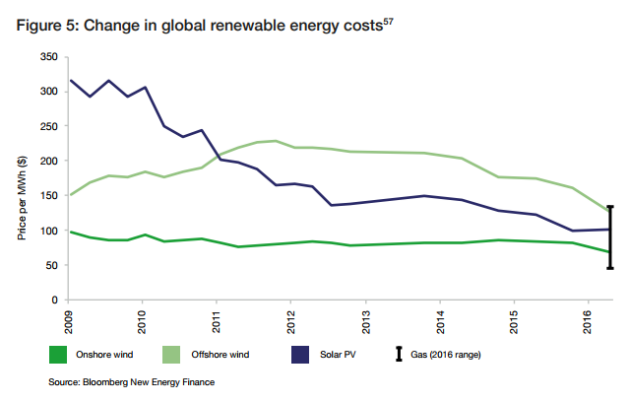UK Clean Growth Strategy: close but no cigar

After a year of deliberation, the UK Government recently published its Clean Growth Strategy to guide the transition towards a low carbon economy. Whilst the majority of the content had been teased into the public domain prior its publication, the announcements provide a fuller picture of the Conservative Government’s plans for energy policy over the next couple of years.
A welcome boost for innovation
Arguably the biggest takeaway from the strategy was the Government’s commitment to a £2.5 billion investment boost for research and the development of low carbon technologies between 2015 and 2021. Clearly, this was a move to attract further investment and enterprise, with £720 million of regulated expenditure put aside for smarter, more flexible gas and electricity networks to help cope with the move towards electric vehicles and the “balancing of the grid”. Post-Brexit uncertainty and the threat of an energy price cap will also have played a pivotal role in the Government’s commitment to further investment and innovation, with the 165-page report completely transparent in the fact that it wants to “create the best possible environment for the private sector to innovate and invest”.
A 21st century plan that will run out of gas?
On the surface, the Clean Growth Strategy is a refreshing, innovative, 21st century plan which will decarbonise our energy system, tackle fuel poverty, and increase our energy supply for years to come. Below the surface, you find that detail is lacking on many complex yet salient issues, such as how to tidy up the way we heat of our homes and buildings, or how to power transport such as the electrification of trains and cars. Indeed, more detail is likely to follow, but there are burning issues manifesting, not just in this publication, but in the Government’s approach to a wider industrial strategy.
For example, the Government has completely shelved two stalwarts of our energy system and wider industrial strategy: onshore wind and natural gas. Quite staggeringly, and even after Energy Ministers Richard Harrington and Claire Perry acknowledged that onshore wind projects could return to play a role in light of reduced costs, the industry is mentioned once, with no real support to accompany the inclusion of these impressive results below (pg. 24).

In turn, shale gas extraction also received no mention, despite being championed in the recent 2017 Conservative Party manifesto. Industry experts and associations have repeatedly said that UK shale gas could provide the country with a useful transition to a low carbon future and that the development of shale gas should work in sync with low carbon energy development. The fact that such a pivotal branch of the UK’s energy mix has been left out indicates that the UK Government is starting to act on the basis of populism, rather than academic research and industry expertise.
General election hangover
For me, the Clean Growth Strategy is somewhat lacking in confidence, produced by a Government suffering from a disastrous election result, and one which is now wary of going against public opinion. Innovation has played such a key part of the strategy as it is the safest route to take, and while a very important route, it will not completely provide the engine we need over the next 10-20 years to help us transition to a low carbon economy, with the rise in electric cars set to put extra demand on the grid.
Remarkable Group have a strong track record of delivering robust consultations for heavily regulated sectors. If you would like more information on energy policy, or require support influencing local decision makers, please contact Remarkable Group at lewis.leach@remarkablegroup.co.uk, or call on 0161 359 4107.
Selected industry experts bring you insight and expert advice, across a range of sectors.
Subscribe for free to receive our fortnightly round-up of property tips and expertise
Selected industry experts bring you insight and expert advice, across a range of sectors.
Subscribe for free to receive our fortnightly round-up of property tips and expertise





